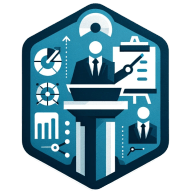5 Lessons On Employee Skill Development You Should Know
In today's rapidly evolving workplace, employee skill development has become a critical factor for organizational success. This article presents essential lessons on fostering employee growth, backed by insights from industry experts. From implementing cross-functional training to personalizing learning paths, these strategies offer practical approaches to enhance your team's capabilities and drive innovation.
- Trust Employees with Stretch Projects
- Implement Cross-Functional Training for Innovation
- Create Structured Mentorship Programs
- Personalize Learning Paths for Each Employee
- Transform Onboarding into Skill Development Foundation
Trust Employees with Stretch Projects
One lesson I wish I had learned earlier is that skill development isn't just about training--it's about trust and timing. Early on, I believed that sending employees to workshops was enough. But over time, I realized people grow fastest when they're trusted with real responsibility, supported at the right moment, and encouraged to take ownership.
At Write Right, I started giving team members stretch projects--tasks just outside their comfort zone but within reach. That simple shift did wonders. Not only did it boost confidence, but it also revealed talents I didn't know they had.
Now, instead of a rigid training calendar, we blend structured learning with on-the-job challenges and mentorship. It's more personalized, more human--and far more effective.
Implement Cross-Functional Training for Innovation
One crucial lesson I've learned about employee skill development is the power of cross-functional training. Early in my entrepreneurial journey, I made the mistake of creating specialized silos—having warehouse staff focused solely on picking and packing, account managers who only understood client relations, and tech teams disconnected from frontline operations.
When I founded ShipDaddy before Fulfill.com, this approach initially seemed efficient, but it created bottlenecks when someone was absent or during growth spurts. More importantly, it limited our team's ability to innovate across boundaries. The breakthrough came when we implemented a rotation program that exposed team members to different aspects of the business.
A warehouse associate who understands our technology platform can provide invaluable feedback on improving usability. Similarly, a software developer who's spent time in the fulfillment center gains practical insights that pure coding knowledge can't provide. This cross-pollination of skills creates a resilient organization where people understand the full ecosystem of our business.
This lesson has profoundly shaped my approach at Fulfill.com. We now emphasize what I call "T-shaped development"—deep expertise in one area combined with broader knowledge across related functions. Every quarter, team members dedicate time to learn adjacent skills, sometimes through formal training but often through collaborative projects that force cross-department cooperation.
The 3PL industry is notoriously fragmented, with specialists who rarely see the whole picture. By developing versatile teams who understand multiple facets of logistics, we've been able to create more innovative solutions for connecting eCommerce businesses with the right fulfillment partners.
The results speak for themselves: more creative problem-solving, greater operational flexibility, and team members who feel more engaged because they see how their work impacts the entire value chain. If I could go back in time, I'd tell my younger self: don't just build specialists—build well-rounded logistics professionals who can see beyond their immediate responsibilities.
Create Structured Mentorship Programs
Throughout my career, I've found that one of the most effective ways to develop soft skills in employees is through mentorship programs. Specifically, pairing junior employees with more experienced mentors who can provide guidance, support, and coaching. In my last role, we implemented a formal 6-month mentorship program for all new hires. Each was matched with a seasoned professional in their department who met with them biweekly to work on everything from communication strategies to conflict resolution tactics. The results were extremely positive - mentees reported feeling far more confident in difficult workplace scenarios and mentors enjoyed passing on their knowledge.
My advice to any organization looking to bolster soft skills is to facilitate connections between your experienced and less experienced staff. A mentorship program allows for low-pressure yet impactful skill-building through trusted relationships. With some structure and oversight, it can lead to measurable improvements in the abilities that allow employees to thrive interpersonally. Mentorship has been one of the most rewarding professional development initiatives I've been a part of.

Personalize Learning Paths for Each Employee
One of the most crucial lessons I've learned about employee skill development is the value of tailored growth opportunities. Early in my career, I tended to offer standardized training sessions that were the same for everyone. Over time, however, I've realized that personalizing learning paths not only boosts individual employee engagement but also enhances overall productivity. By observing each team member's unique strengths and areas for improvement, I can facilitate more focused and relevant development programs.
This approach has significantly shifted how I manage teams and plan for growth within an organization. Instead of deploying a one-size-fits-all strategy, I now spend time with each team member to understand their career aspirations and learning styles. This has led to more satisfied employees who feel valued and understood, dramatically reducing turnover rates. Aligning their goals with the company's needs creates a more harmonious and proactive workforce. The lesson here? Taking the extra time to customize learning experiences can lead to more profound and impactful results, both for the employees and the organization.

Transform Onboarding into Skill Development Foundation
Skill development starts with how you onboard.
One thing I've learned is that onboarding is the foundation for skill development. Early on, I treated onboarding like a checklist -- get the tools set up, share the documents, introduce the team. But that approach left people unclear on where to focus and how to contribute meaningfully from day one.
Now, I treat onboarding as a chance to set direction, build confidence, and create momentum. It's less about dumping information and more about helping new hires understand how their skills apply in context: i.e., what good work looks like, how we make decisions, and what we actually value as a team.




